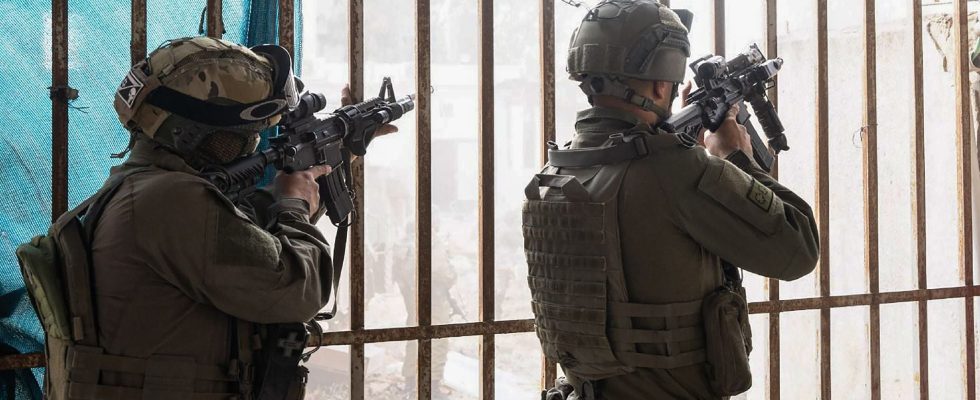The Israeli army increased its bombings and artillery fire on Tuesday, May 7, in Rafah, in the south of Gaza, in order to put “pressure” on Hamas a few hours before new talks in Cairo to try to influence a peace agreement. truce to which the Islamist movement gave the green light. Civil Defense reported numerous deaths in the city where 1.2 million Palestinians were still crowded last weekend, the majority displaced by the fighting.
Information to remember
⇒ Israel took control of the Rafah crossing point
⇒ Calls to evacuate certain areas of Rafah have begun
⇒ A delegation from Qatar to Cairo to relaunch truce negotiations
Israel takes control of the Rafah crossing point
The Israeli army announced on Tuesday that it had taken control of the Palestinian part of the Rafah crossing point between the Gaza Strip and Egypt.
An armored unit “maneuvered in the area. At the moment, special forces are inspecting the crossing point” of Rafah, “we have operational control of the area”, affirmed the Israeli army during a press briefing, specifying that we were speaking “only on the Gaza side of the crossing point”.
“Many deaths” in the night’s bombings
Civil Defense in the Gaza Strip reported “numerous deaths” overnight in Rafah. And the Kuwaiti hospital, located in this city, said it had received “11 dead” and “dozens of wounded” in these strikes, thus recording an initial toll of five dead. Witnesses and Palestinian security sources report airstrikes late Monday and early Tuesday, May 7, as well as intense artillery fire across the Gaza Strip, and more particularly in Rafah and its surroundings.
After its operations in Gaza City, then Khan Younes, Israel has been threatening for weeks to push its ground offensive as far as Rafah, considered the last bastion of Hamas but where 1.2 million people were still crowded last weekend. Palestinians, the majority displaced by the fighting. On Monday, after talks in Cairo failed to produce a truce agreement, the Israeli army began an operation to evacuate tens of thousands of people from Rafah.
Residents flee ‘in fear’
These evacuations concern 100,000 people taking refuge east of Rafah. In leaflets dropped on eastern Rafah neighborhoods, the army warns that it is “preparing to act forcefully against terrorist organizations” and asks residents to “immediately evacuate to the expanded humanitarian zone of al-Mawasi “, about ten kilometers from Rafah.
“Residents are evacuating in terror and panic,” Ossama al-Kahlout, a Palestinian Red Crescent official in eastern Rafah, told AFP, adding that the designated areas were home to around 250,000 people. “My family and I, 13 people, don’t know where to go,” confides Abdelrahmane Abou Jazar, a 36-year-old man. This area lacks “place to pitch tents or schools to shelter us”.
New negotiations in Cairo
Monday evening, after the start of evacuations in Rafah, Hamas said it had informed Egypt and Qatar, mediator countries with the United States, that it had “approved their proposal for a ceasefire agreement.” with Israel. But this proposal is “far from Israeli demands”, retorted the office of Prime Minister Benjamin Netanyahu. The war cabinet decided “unanimously” to continue “the operation in Rafah in order to exert military pressure on Hamas with the aim of progressing towards the release of the hostages and the achievement of other objectives of the war”, indicated the Prime Minister’s services.
“Although Hamas’ proposal falls far short of key Israeli demands, Israel will send a high-ranking delegation to Egypt with the aim of maximizing the chances of reaching an agreement on terms acceptable to Israel,” they added. Shortly after this declaration, Qatar announced the sending on Tuesday morning of a delegation to Cairo “to relaunch indirect negotiations between the two parties […] with the hope of reaching an agreement for an immediate and permanent ceasefire” in “exchange of prisoners and hostages”.
According to the number 2 of Hamas’s political branch in Gaza, Khalil al-Hayya, the proposal includes three phases, each lasting 42 days, and includes a complete Israeli withdrawal from the territory, the return of the displaced and an exchange of hostages held in Gaza and Palestinian prisoners held by Israel, with the aim of a “permanent ceasefire”. Until now, Israel has opposed a complete withdrawal of its troops from Gaza and a permanent ceasefire, believing it must first carry out an operation on Rafah to “defeat” Hamas.
Demonstrations in Tel Aviv in favor of a truce
In Israel, the Families Forum, an association of hostage relatives, judged Monday that “the time has come for all parties concerned […] to transform this opportunity into an agreement for the return of all the hostages”. And during the night, Israeli media reported clashes in Tel Aviv between police and demonstrators in favor of a truce agreement.
“I made a very strong appeal today to the Israeli government and Hamas leaders to make an extra effort to materialize a vital agreement,” said UN Secretary-General Antonio Guterres. In the absence of an agreement, the international community fears an imminent ground operation on Rafah which “would be intolerable due to its devastating humanitarian consequences […]”added Antonio Guterres.
